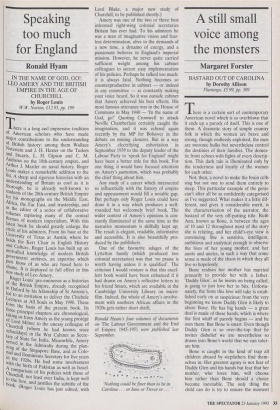Speaking too much for England
Ronald Hyam
IN THE NAME OF GOD, GO!: LEO AMERY AND THE BRITISH EMPIRE IN THE AGE OF CHURCHILL by Roger Louis W. W. Norton, £12.95, pp. 199 therehere is a long and impressive tradition American scholars who have made major contributions to the understanding of British history: among them Wallace Notestein and J. H. Hexter on the Tudors and Stuarts, L. H. Gipson and . C. M. Andrews on the 18th-century empire, and Arthur J. Marder on naval history. Roger Louis makes a remarkable addition to the list. A sharp and rigorous historian with an understanding of Britain as cool as it is thorough, he is already well-known .to students of the 20th-century British Empire for his monographs on the Middle East, Africa, the Far East, and trusteeship, and as the editor of a series of collaborative volumes exploring many of the central themes of modem imperialism. With this latest book he should greatly enlarge the circle of his admirers. From his base at the University of Texas at Austin, where he holds the Kerr Chair in English History and. Culture, Roger Louis has built up an unrivalled knowledge of modern British government archives, an expertise which Puts those of us who are based here to shame. It is deployed to full effect in this new study of Leo Amery. Roger Louis' pre-eminence as a historian 5 the British Empire, already recognised in Oxford by his fellowship of St Antony's, led to an invitation to deliver the Chichele Lectures at All Souls in May 1990. These form the basis of the present book. Its three principal chapters are chronological, taking us from Amery as the young protégé of Lord Milner to the uneasy colleague of Churchill (whom he had known since schooldays) in the War Cabinet as Secre- tary of State for India. Meanwhile, Amery served in the Admiralty during the plan- fling of the Singapore Base, and as Colo- nial and Dominions Secretary for five years le. the 1920s. He had some involvement With the birth of Pakistan as well as Israel. Churchill of his policies with those of tLnurohIlL not least over India, is kept well ,0 the fore, and justifies the subtitle of the nook. (Roger Louis has just edited, with Lord Blake, a major new study of Churchill, to be published shortly.) Amery was one of the two or three best informed right-wing colonial secretaries Britain has ever had. To his admirers he was a man of imaginative vision and fear- less determination, alive to the demands of a new time, a dynamo of energy, and a passionate believer in England's imperial mission. However, he never quite carried sufficient weight among his cabinet colleagues to secure easy implementation of his policies. Perhaps he talked too much: it is always fatal. Nothing becomes so counterproductive in cabinet — or indeed in any committee — as constantly making your voice heard. So it was outside cabinet that Amery achieved his best effects. His most famous utterance was in the House of Commons in May 1940 — 'In the name of God, go!' Quoting Cromwell to attack Neville Chamberlain certainly caught the imagination, and it was echoed again recently by the MP for Bolsover in the debate on mining closures. But in a way Amery's electrifying exhortation in September 1939 to the deputy leader of the Labour Party to 'speak for England' might have been a better title for this book. For one thing, it would have focused attention on Amery's patriotism, which was probably the chief thing about him. Any study of a career which intersected so influentially with the history of empire and appeasement would fill a notable gap. But perhaps only Roger Louis could have done it in a way which produces a well- rounded but welcomely brief book. The wider context of Amery's opinions is con- stantly illuminated at the same time as the narrative momentum is skilfully kept up. The result is elegant, readable, informative and accessible. It is also beautifully pro- duced by the publishers. One of the favourite adages of the Lyttelton family (which produced two colonial secretaries) was that 'no praise is worth having unless it is qualified'. The criticism I would venture is that this excel- lent book would have been enhanced if it had drawn on Amery's reflective letters to his friend Smuts, which are available in the Cambridge University Library on micro- film. Indeed, the whole of Amery's involve- ment with southern African affairs in the 1920s gets rather short shrift.
RonaldHyam's four volumes of documents Government and the End on The Labour Gove of Empire 1945-1951 were published last September.
'Nothing could be finer than to be in Carolina. . . or Jane or Trevor or . . . '


























































 Previous page
Previous page